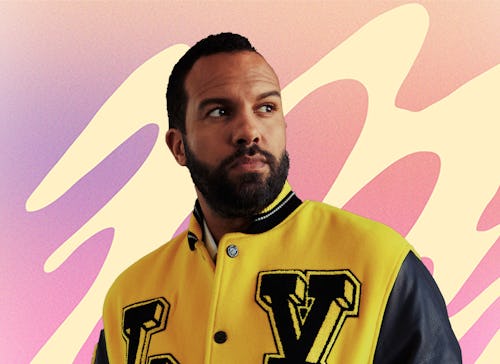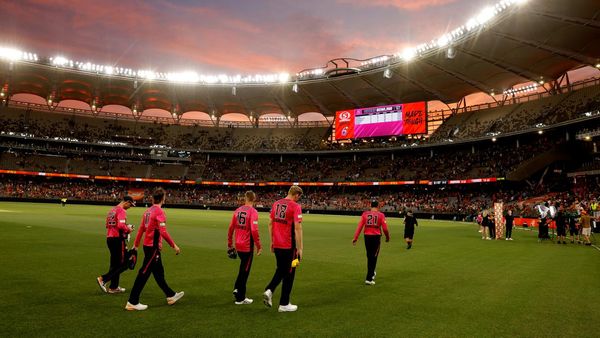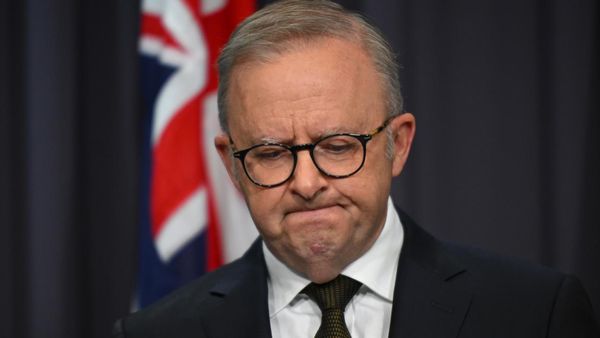
When he was offered the opportunity to play Barack Obama, actor O-T Fagbenle says he was hesitant to take it — but not because he thought the gig would be too challenging. His concerns were actually connected to the quality of the role and the project.
“I think biographies can sometimes be puff pieces. I want to be involved with work which is challenging and affects people,” he told Mic during a recent Zoom call. But a conversation with director Susanne Bier, where he heard her vision for the role and the project, convinced him to take it. “I became very intrigued by the possibility of really knowing what Barack and Michelle’s relationship was like when the doors were closed, and us exploring that.”
Fagbenle’s intention behind accepting the role is indicative of the focus that has earned him his success. He’s a man with a mission to use his art and his craft to leave the world a little better than it was when he found it. He’s given nuanced, powerful portrayals as Luke Bankole, the husband of main character June Osborne on Hulu’s hit series The Handmaid’s Tale, and in addition to acting, Fagbenle is into writing, directing, and mentoring young artists who hope to do the same.
It all starts, however, with his ability to see himself in the characters he depicts.
While researching his performance as the former U.S. president, he discovered things about Obama that humanized him beyond the pedestal that people placed him on. He refers to one of Obama’s earliest races for the Illinois State Senate, when the then-candidate found out one of his opponents should not have even been eligible to be on the ballot, and got them struck down on a technicality. Fagbenle said that gave him a special insight into the ambition necessary to become president of the United States.
“One of the things that fascinated me is that it doesn't happen by accident,” he said. “... You have to want it, and you have to go for it with a sort of monomaniacal drive. And of course, on the other side, you must be very charming and personable, but you must have that drive.”
He also recognized the level of sacrifice the entire Obama family had to make in order for Barack to be president.
“Ultimately, to become president, there is a price that your family is going to pay for that. Their lives are at risk; their privacy was compromised as well as their ability to grow up normally,” he said. “...Of course, the other side of that is him becoming president also helps his children, because if you can live in a country with a Black president, then Black children are going to live in a better world in the next generation and the generation after that.”
Fagbenle says that the role left him with deep admiration and a more complex view of Obama. Still, he felt that it wasn’t his role to further romanticize him.
“My job was to find out what are the insecurities? What are the fears?” he asked. “What are the times he messed up?”
While listening to the Renegades: Born in the USA podcast Obama recorded with musician Bruce Springsteen, he was amazed to hear an episode in which No. 44 discussed Michelle telling him about how he could be a better husband.
“I thought, wow! The most perfect man in the world has things to learn? Even as a 50-year-old?” he says. “Sometimes it’s important for us to have heroes who shine as ideals that we can live up to. But it’s also important to remember that every person is a human being with their flaws and their own idiosyncrasies.”
While Fagbenle made it a point not to glamorize Obama, he took no such pains when discussing his costar Viola Davis, who plays Michelle Obama in the series. Davis is the only African American to achieve the Triple Crown of Acting with an Academy Award, a Primetime Emmy Award, and two Tony Awards.
“Working with Viola feels like sitting next to a rushing river,” Fagbenle beamed. “Rivers power cities. They’ve got energy. So you sit next to this river and it’s authentic, and it’s powerful, and it’s driven. Let me sit by the river again, is what I’ve got to say.”
Barack Obama isn’t the only character Fagbenle has dug deep for. He’s played many roles in American television, film, and theater productions. When the actor — who was born in London to a British mother and Nigerian father — was working to perfect his African American accent for his roles, he was able to tap into that experience in an unexpected way.
“If you can live in a country with a Black president, then Black children are going to live in a better world in the next generation and the generation after that.”
“I would go around in a day doing my African American accent, and I would have this deep desire at the end of the day to stop doing it and go back to my English accent,” he said. British actors have to adopt American accents often since so many television roles and plays require it, but Fagbenle realized while perfecting his African American accent that he was treated differently — making him cognizant of the subtle racism that so many people face when entering a store or interacting with members of authority like law enforcement.
“It really struck me, the unconscious burden — African Americans disproportionately suffer from mental health issues, and there are a variety of reasons for that,” he realized. “But this subtle racism became much more apparent to me when I didn’t have the shield of my British accent — it was so upsetting to think that there was such a very subtle but insidious attack against the person because of how they sound.”
His time while working on his accent gave him firsthand experience with racism, but otherwise, he searches deeply to find humanity in the people he’s depicting, to forge a relationship between himself and his characters. He’s worked at it since his first role in a theater production of Lorraine Hansberry’s Les Blancs, through other roles as Mercutio in an English Touring Theatres production of Romeo & Juliet and as Paul in Six Degrees of Separation at a production at the Royal Exchange, Manchester.
“Whatever role I take on, I try to discover that. What are the things about themselves that they are unaware of, and how does that affect their lives?” he says. “... I think the job of the artist is to reveal themselves through character or through song to the audience, and in that revelation, the audience recognizes themselves and are moved.”
In The Handmaid’s Tale, whe earned an Emmy nomination for his portrayal of Luke Bankole, a man who is separated from his wife and child ahead of the nightmarish, totalitarian government of Gilead. Some of his understanding of the role, he admits, isn’t even explicitly stated in the script.
“It’s going to sound really unsympathetic, but I think Luke’s a coward,” he says. “He’s afraid of standing up against Gilead when it first comes. He’s afraid of making a stand. He’s afraid of going back to Gilead to get his daughter. He’s afraid, and he hates himself for his cowardice. … He tries to compensate for it by going to the [protests] and the embassy, and he tries to compensate for it with unwavering love and devotion [for June]. I think when he got Nicole [June’s daughter by another man], that was an opportunity to redeem his cowardice ... to make up for this huge flaw.”
Fagbenle’s intention goes beyond doing his best on-screen and on stage, though. He’s writing two projects with his brothers Daps and Luti, both focused on stories from the diaspora and Africa, because Fagbenle believes there aren’t enough of those. He mentors young people (“what I tell them when I help them with their auditions is ‘’comprehension is your number one job. You have to understand this person and what pulls them, what motivates them, what are they afraid of?”), and he runs a charity that helps educate young Zimbabwean girls in tech.
He also aims to use his work to change perspectives around identity — and it goes deeper than race. He says that when he was in Nigeria, the locals considered him to be a foreigner. In South Africa, he was considered “colored,” and in the U.S., he is thought of as African American even though he is not American. He cites his Nigerian spin on Mercutio in Romeo & Juliet as his favorite role, grateful for the opportunity to “change up the establishment.” He also enjoyed playing Levee in a Nashville stage production of Ma Rainey’s Black Bottom, calling it “a very spiritual and healing experience.”
“It’s interesting what identity is and who it is serving. Putting yourself in a box, who is that serving?” he asks. He’s passionate about equality, racial justice, and economic justice, but he doesn’t always believe that categorization is the only vehicle to pursue those causes.
“I am always careful to not unthinkingly take on labels and identities without knowing that the purpose of taking that on is a step toward justice, as opposed to a step towards doing what the powerful often want, which is us being segregated.”
Fagbenle puts a lot of work into his craft, taking deep dives into the minds of the characters he plays and building a foundational understanding of all his projects. But ultimately, he says, he’s a family man and an artist.
“I’m a man whose greatest wealth and honor is my family. That’s number one. I’m a person who cares a lot about young people,” he says. “...I guess I’m an artist. I’m a person who is driven to contribute stories to people, and I think in some ways the job of the artist is to reflect the most intimate parts of themselves to others.”







